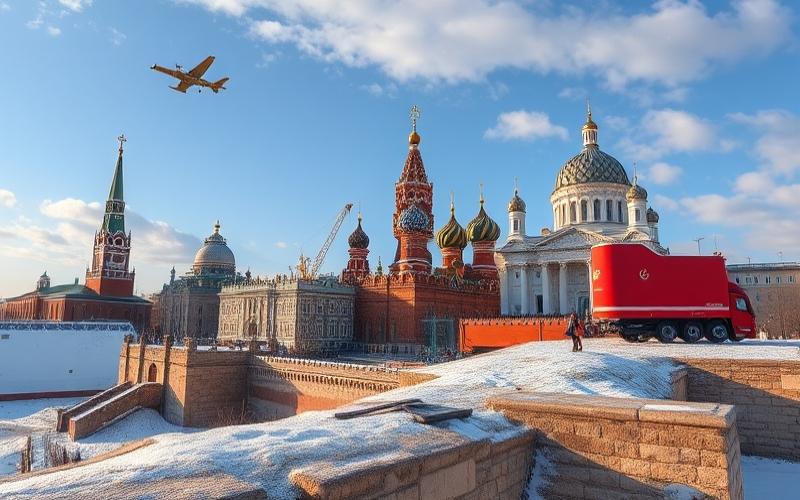
 Published on and written by Cyril Jarnias
Published on and written by Cyril Jarnias
Importing a pet to Russia can be an exciting adventure, but it requires navigating through a complex set of regulations and essential procedures to follow. From obtaining a pet passport to rigorously updating required vaccinations, each step is crucial to ensure smooth passage through Russian borders.
Owners must prepare to handle various administrative documents, thereby ensuring not only compliance with laws but also the optimal well-being of their four-legged companion.
In this article, you will discover the keys to turning this process into a smooth and stress-free experience.
Details of Veterinary Formalities for Pets Relocating to Russia
Required Veterinary Documents for Import to Russia:
- International veterinary passport, containing all identification information and vaccines.
- Official veterinary health certificate, issued within 5 days prior to departure.
- Identification via microchip compliant with ISO 11784/11785.
- Import permit (depending on the country of origin or if more than two animals are imported).
- Proof of antiparasitic treatment (especially against tapeworms, depending on origin).
| Document | Timeline Before Departure | Issuing Authority |
|---|---|---|
| Health Certificate | ≤ 5 days | Licensed Veterinarian |
| Rabies Vaccination | ≥ 21 days before arrival | Licensed Veterinarian |
| International Passport | Before travel | Veterinarian |
| Import Permit | Variable | Rosselkhoznadzor |
Essential Vaccination Verification Process:
Vaccinations Required by Russia:
– Rabies: mandatory vaccine. Serum titer must show a result ≥ 0.5 IU/ml. Vaccination must be administered at least 21 days before entry into the territory and remain valid throughout the stay (boosters up to date).
– Leptospirosis: required for certain species or according to local regulations; check with your veterinarian.
Procedure to Follow:
- Verify the validity of vaccines recorded in the international passport.
- Perform a rabies serum titer test if requested (result above the required standard).
- Ensure all boosters comply with Russian timelines.
Obtaining a Valid Health Certificate:
- Schedule an appointment with a licensed veterinarian a few days before departure.
- Undergo a complete clinical examination certifying that the animal is healthy and free from contagious diseases.
- Obtain the official certificate; it must be dated no more than five days before arrival in Russia.
Timelines to Respect Before Travel:
- Rabies vaccination: minimum 21 days
- Health certificate: maximum five days
- Rabies serum titer: as needed, several weeks prior
Clinical Examination Just Before Departure:
- Visit a certified veterinarian within the last five days before your flight.
- General check-up (temperature, overall condition, absence of external/internal parasites).
- Final validation on the official health certificate.
Checks and Quarantine Upon Arrival in Russia:
At the Russian airport:
- Mandatory passage through the designated border veterinary checkpoint
- Presentation of original documents
- Quick physical examination by a health officer
If all criteria are met:
> Issuance of a Russian international health certificate
In case of irregularity:
> Possible temporary detention or refusal of entry
Quarantine is generally not systematic but may be imposed if there is doubt about compliance or suspicion of disease.
Specific Restrictions on Animal Breeds/Species:
– Certain breeds considered dangerous may be subject to additional restrictions or temporary bans according to evolving Russian legislation
– Limited importation regarding total number; special permit required for more than two dogs/cats or unaccompanied animals
For certain exotic pets (NAC), exotic birds, or reptiles:
> Imperatively check specific requirements with the Rosselkhoznadzor Service
Summary List – Main Steps:
- Verification of identification & international passport
- Update of essential vaccines (+ rabies titer)
- Consultation with a licensed veterinarian for examination and certificate
Administrative Steps to Obtain a Pet Passport in Russia:
1. Animal Identification
– The animal must be identified by a microchip (mandatory for most species, especially dogs and cats) or a legible tattoo.
2. Mandatory Vaccinations
– Dogs: Rabies, Distemper, Hepatitis, Viral Enteritis, Parvovirus and Adenovirus infections, Leptospirosis (unless specific prophylactic treatment is applied).
– Cats: Rabies and Panleukopenia.
– Ferrets: Mainly rabies.
– Vaccines must be administered at least 20 days before departure if not an annual booster, or 21 days for a primary vaccination.
3. Documents to Provide
- Proof of identification (microchip or tattoo certificate).
- Up-to-date vaccination record.
- Official veterinary certificate (Form No. 1 or No. 15 as applicable).
- For animals not vaccinated against rabies and under 3 months old: specific veterinary certificate instead of a passport.
4. Examination by a Licensed Veterinarian
- Schedule an appointment with a veterinarian accredited by Russian authorities.
- The examination must take place within 14 days prior to travel.
- The veterinarian checks health status, identification, and vaccinations, then completes and issues the pet passport or veterinary certificate as applicable.
5. Timelines to Respect
- Vaccinations: 20 to 21 days before departure depending on the type of vaccination.
- Final veterinary examination: within 14 days before importing the animal.
| Species | Identification | Mandatory Vaccinations | Document to Provide |
|---|---|---|---|
| Dog | Microchip or Tattoo | Rabies, Distemper, Hepatitis, Viral Enteritis, Parvovirus, Adenovirus, Leptospirosis | Pet Passport or Certificate |
| Cat | Microchip or Tattoo | Rabies, Panleukopenia | Pet Passport or Certificate |
| Ferret | Microchip or Tattoo | Rabies | Pet Passport or Certificate |
| Other | Depending on species | According to specific regulations | Specific Veterinary Certificate |
Procedure for Passport Issuance:
- Schedule an appointment with a licensed veterinarian.
- Bring all documents (identification, vaccination proofs).
- The animal is examined and the passport is completed on-site, with the veterinarian’s signature and stamp.
Validity and Duration of the Passport:
- The pet passport is valid as long as vaccinations are up to date.
- For veterinary certificates (if the animal does not have a passport): validity limited to 10-14 days for travel.
Potential Costs:
- Veterinary consultation fees for examination and passport issuance.
- Cost of vaccination if not up to date.
- Cost of microchip implantation if necessary.
Additional Information:
- The Russian pet passport is recognized for international travel, but an official veterinary certificate may be required depending on the destination.
- For certain exotic pets or uncommon species, specific requirements or prior authorizations may apply.
Key Takeaways:
> Planning must be done in advance to respect vaccination timelines and the veterinary examination, ensuring the validity of the passport or certificate at the time of border crossing.
Good to Know:
To obtain a pet passport in Russia, you must provide proof of vaccination and a veterinary certificate after an examination by a licensed veterinarian, with costs that may vary depending on the animal species. Issuance can take up to a month, so plan accordingly before importation.
Mandatory Vaccines for Importing Animals to Russia
Russian authorities require that any imported pet (dog, cat, ferret) be identified (microchip or legible tattoo) and vaccinated against rabies. This vaccine is mandatory for all carnivorous animals entering Russia. The minimum period between the rabies vaccination and importation must be at least 20 to 21 days, especially in the case of a primary vaccination; if the vaccine was administered within the last 12 months, this period may not apply.
For Dogs:
- Rabies vaccine
- Distemper vaccine
- Hepatitis vaccine
- Viral enteritis vaccine
- Vaccine against parvovirus and adenovirus infections
- Vaccine or prophylactic treatment against leptospirosis
For Cats:
- Rabies vaccine
- Panleukopenia vaccine
Summary Table of Required Vaccines:
| Animal Type | Rabies | Distemper | Hepatitis | Parvovirus/Adenovirus | Leptospirosis | Panleukopenia |
|---|---|---|---|---|---|---|
| Dog | ✔ | ✔ | ✔ | ✔ | ✔ | |
| Cat | ✔ | ✔ |
The rabies vaccine is imperative for all.
Exceptions exist for the importation of unvaccinated puppies and kittens under three months old: they can enter Russia without a rabies vaccination but must be accompanied by a specific veterinary certificate (Form No. 15).
Additional Protocols Depending on the Exporting Country:
- Certain prophylactic treatments may replace some vaccines if their effectiveness is recognized by the exporting country.
- Requirements vary according to the health status of the exporting country regarding animal diseases.
List of Mandatory Documents:
- International veterinary passport or official veterinary certificate compliant with international standards.
- Written proof of complete vaccination status.
Important Points When Crossing the Russian Border:
Upon arrival, an official veterinary control will verify all your documentation. In case of absence or non-compliance of documents/vaccines, access to Russian territory may be refused or delayed.
Additional Precautions:
Contact the veterinary service of the Russian airport a few days before your arrival to avoid any unforeseen issues related to document control.
Strict compliance with Russian requirements—electronic identification/legible tattoo, complete vaccination according to animal species, and rigorous presentation of certificates—determines a smooth process at the Russian border. Any documentary anomaly exposes the animal to quarantine or even refusal of entry.
Complete and compliant documentation: essential to guarantee a successful import to Russia!
Good to Know:
The rabies vaccination is mandatory for all pets entering Russia and must be administered at least 30 days and at most 12 months before entry. For dogs, vaccines against leptospirosis, parvovirus, and distemper are often required, while cats generally need vaccines against calicivirus and panleukopenia.
Disclaimer: The information provided on this website is for informational purposes only and does not constitute financial, legal, or professional advice. We encourage you to consult qualified experts before making any investment, real estate, or expatriation decisions. Although we strive to maintain up-to-date and accurate information, we do not guarantee the completeness, accuracy, or timeliness of the proposed content. As investment and expatriation involve risks, we disclaim any liability for potential losses or damages arising from the use of this site. Your use of this site confirms your acceptance of these terms and your understanding of the associated risks.























































